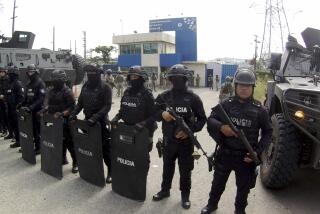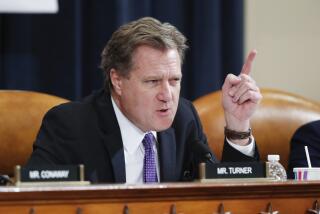Reagan Pledges Secure Embassy : Says New Facility in Moscow May Have to Be Razed to Avert Spying
- Share via
WASHINGTON — President Reagan said Tuesday that if the new American Embassy being built in Moscow cannot be made secure from Soviet spying, the United States may have to destroy it and build another facility.
Reagan also said that Soviet diplomats will not be allowed to transfer to their new embassy in Washington until American officials occupy the new U.S. Embassy in Moscow, a move that will not take place until he is sure that the facility is safe from Soviet eavesdropping.
Soviet espionage reportedly has reached into some of the most secure rooms in the U.S. Embassy and one Reagan Administration official said that an initial assessment has concluded that virtually all arms control communications in and out of Moscow have fallen into Soviet hands in the last year.
The President on Tuesday named former Defense Secretary Melvin R. Laird to assess the security damage at the existing U.S. Embassy, which has resulted from the Marine sex-and-spy scandal, and to review concerns that the new building under construction may already be bugged.
Other Embassies
In addition, Reagan has asked one of his presidential advisory boards to evaluate the security at U.S. embassies worldwide, as well as at the new Moscow facility. If security cannot be ensured at the Moscow embassy, he said, “it may be necessary to destroy and rebuild it.”
Reagan disclosed the steps in a hastily announced appearance in the White House press briefing room. By making the announcement himself, offering his first comments at length on the successful Soviet effort to gain access to the embassy’s most secure areas, he appeared to be demonstrating an aggressive effort to respond to the fiasco.
“While all the facts are not known, it is clear that security implications are widespread and that additional quick action is required to prevent further damage to our national security,” the President said in remarks carried on live national broadcasts.
“The United States will not occupy our new embassy building in Moscow unless and until I can be assured that it is safe to move into a secure embassy environment,” Reagan said. “Likewise, the Soviet Union will not be allowed to occupy its new facility in Washington until a simultaneous move by both countries is possible.”
In a complex series of negotiations dating back to 1969, the United States and the Soviet Union agreed to construct new embassies and move into them simultaneously. Although Soviet families have been allowed to move into living quarters at the new Washington facility since it was completed in 1985, no diplomatic activities are allowed there.
Problems in the U.S. Embassy in Moscow have come to light recently since two Marine sentries there were charged with espionage. The charges stem from allegations that they had sexual affairs with Soviet women employed at the embassy and that KGB agents were allowed into sensitive areas at the facility.
The President said embassy security will be a “major agenda item” during Secretary of State George P. Shultz’s meetings with Soviet officials in Moscow next week.
Shultz ‘Out of Sorts’
Administration response to the espionage scandal has been complicated by the fact that Shultz is about to confer with Soviet Foreign Minister Eduard A. Shevardnadze on major arms control issues. The secretary was described as “a little bit out of sorts” as he hurried out of a White House meeting in preparation for the trip.
Shultz was said to be upset over how firm a stance the United States would take in retaliation for the spying, apparently out of concern that a period of recrimination could poison the atmosphere for the arms control talks.
When asked how the United States could bargain with the Soviets in light of the recent espionage disclosures, Reagan told reporters that “you don’t stop doing business” as a result of spying.
‘Grave Questions’
But National Security Adviser Frank C. Carlucci, appearing after the President at the White House briefing, acknowledged that Shultz “had grave questions” about proceeding with his trip.
Administration officials, speaking on condition of anonymity, said Reagan moved publicly on the issue Tuesday for two reasons:
--White House officials were concerned that he appeared to be “not really involved in the process when he actually is,” one Reagan aide said, adding: “If you’re doing something, you ought to get credit for what you’re doing.”
--In the words of another Administration source, White House officials were “really exercised about this whole thing. There’s a lot of grief being spread around because the President is recognizing now that the damage is so very significant, so widespread.”
Assessing Damage
This source said officials are trying to determine “how many of our positions on arms control were poisoned from the beginning” as a result of the Soviet ability to eavesdrop on conversations within the embassy and communications dispatched from the high-rise building in central Moscow.
The official also said that communications equipment at the embassy that may have been compromised cannot be replaced in time for Shultz’s visit. The source said that a “bubble”--in effect “a room made of translucent plastic, honeycombed for (sound) insulation”--would most likely be flown in from the United States.
“You sit in the damn thing and you can see through it, so you know it isn’t being bugged. That’s how it provides security,” he said.
Ambassador Protests
In Moscow, Jack Matlock, the new U.S. ambassador, raised a protest with the Soviet Foreign Ministry over the spying efforts, State Department spokesman Charles Redman said.
In addition to the report that Laird, defense secretary under President Richard M. Nixon, will prepare for Shultz under Reagan’s instructions, the President’s Foreign Intelligence Advisory Board will study security problems at U.S. embassies around the world. Laird and the intelligence panel were given 90 days to prepare their reports.
Three other espionage investigations--by the State Department, the FBI and the Navy--are being conducted. The Marine Corps is part of the Navy Department.
Schlesinger Study
James R. Schlesinger, another former defense secretary, was asked by Shultz in February to study the problems at the $191-million embassy under construction in Moscow to determine whether U.S. personnel can work there without fear of Soviet eavesdropping, Carlucci said.
Senate Majority Leader Robert C. Byrd (D-W.Va.), meanwhile, said Soviet diplomats should be barred from their new embassy, which has been built atop one of the highest hills in Washington, a location that could facilitate interception of electronic communications.
“Put the Soviets in a swamp,” he said at a news conference. “See if you can’t find a good one--with all alligators.” Byrd said Reagan would “be a fool” to allow the Soviets to move into their new embassy.
More to Read
Sign up for Essential California
The most important California stories and recommendations in your inbox every morning.
You may occasionally receive promotional content from the Los Angeles Times.









